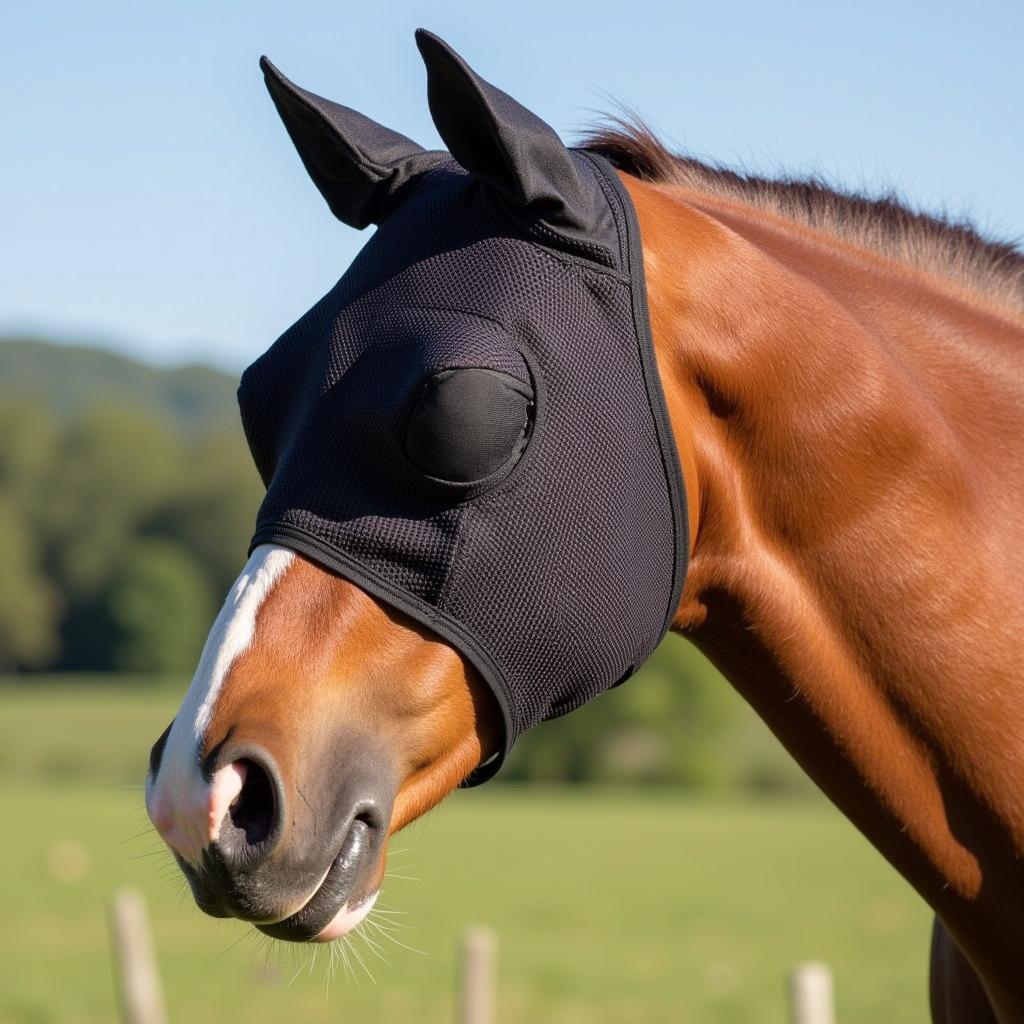A UV fly mask for your horse is more than just a fashion statement; it’s a crucial piece of equipment that protects your horse’s sensitive eyes and face from harmful UV rays, pesky insects, and airborne debris. Understanding the benefits, choosing the right mask, and ensuring proper fit are essential to maximizing your horse’s comfort and well-being.
Choosing the right UV fly mask for horses involves considering several factors. Material, design, and fit are paramount to ensuring your horse’s comfort and the mask’s effectiveness. Not all fly masks offer UV protection, so carefully check product descriptions. Look for masks specifically labeled with “UV protection” or indicating a UPF (Ultraviolet Protection Factor) rating. The higher the UPF, the better the protection.
Understanding the Importance of a UV Fly Mask
Why is a UV fly mask so crucial for your horse? Horses are particularly vulnerable to eye problems due to their large eyes and constant exposure to the elements. UV rays, much like with humans, can cause long-term damage to the cornea and lens, leading to conditions like cataracts and squamous cell carcinoma.
A good quality UV fly mask acts as a barrier against these harmful rays, significantly reducing the risk of eye diseases. Moreover, fly masks protect against irritating flies, gnats, and other insects that can transmit diseases and cause discomfort. They also shield the eyes from dust, debris, and pollen, which can irritate the eyes and cause excessive tearing.
 Close-up of a horse wearing a UV fly mask
Close-up of a horse wearing a UV fly mask
A properly fitted fly mask should sit comfortably on the horse’s face without rubbing or chafing. It should cover the eyes and ears completely, offering maximum protection. The mask should also allow for good visibility and ventilation to prevent overheating and discomfort.
Choosing the Right UV Fly Mask for Your Horse
There are various types of UV fly masks available on the market, each with its unique features and benefits. Mesh masks offer excellent ventilation and visibility, while those made from softer, more flexible materials prioritize comfort. Some masks even include ear covers for added protection against insects and sun. Browse our collection of best fly masks for horses to find the perfect one.
When selecting a UV fly mask, consider your horse’s individual needs and sensitivities. If your horse is prone to allergies, opt for a hypoallergenic material. For horses with pink skin around their eyes, ensure the mask offers maximum UV protection. And if your horse is particularly bothered by insects, consider a mask with a fine mesh that effectively keeps even the smallest bugs at bay. Find your perfect fit with our range of horse accessories online.
Ensuring a Proper Fit for Optimal Protection
Once you’ve chosen a UV fly mask, ensuring a proper fit is crucial for maximizing its effectiveness and your horse’s comfort. A poorly fitting mask can rub and chafe, causing sores and irritation. It can also slip and obstruct the horse’s vision, potentially leading to accidents.
To find the right size, measure your horse’s face from the center of the forehead to the corner of the mouth. Consult the manufacturer’s sizing chart to determine the appropriate size for your horse. When putting on the mask, be gentle and patient, ensuring it sits snugly but not too tightly.
Does My Horse Need a UV Fly Mask Year-Round?
While the need for a UV fly mask might be more obvious during the summer months, many horse owners find it beneficial to use them year-round. UV rays are present even on cloudy days, and flies and other insects can be a nuisance in any season. Providing consistent eye protection can contribute to your horse’s long-term eye health. Need more eye protection options? Check out our horse eye protection page.
Caring for Your Horse’s UV Fly Mask
Regular cleaning of your horse’s UV fly mask is essential to maintaining its effectiveness and hygiene. Remove the mask daily and brush off any dirt or debris. Wash the mask weekly with mild soap and water, ensuring it is thoroughly rinsed and dried before putting it back on your horse.
In conclusion, investing in a high-quality UV fly mask is a wise decision for any horse owner. It offers essential protection against UV rays, insects, and airborne debris, contributing to your horse’s overall comfort, health, and well-being. Explore more eye coverings options at our eye coverings for horses page. By carefully selecting the right mask and ensuring a proper fit, you can provide your equine friend with the best possible care and protection.
FAQ
- How do I know what size UV fly mask my horse needs? Measure your horse’s face from forehead to mouth and consult the sizing chart.
- Can my horse wear a UV fly mask while riding? Yes, some masks are designed for riding.
- How often should I clean my horse’s fly mask? Ideally, clean it weekly.
- Are all fly masks UV protective? No, look for the “UV protection” label.
- Can a UV fly mask prevent all eye problems? No, but it significantly reduces risk.
- Do horses need fly masks in the winter? Yes, UV rays and insects can still be present.
- What materials are UV fly masks made of? Common materials include mesh and lycra.
Common Scenarios:
- Scenario 1: Your horse constantly rubs its eyes. A fly mask can help alleviate this by protecting from irritants.
- Scenario 2: Your horse has pink skin around its eyes. A UV fly mask is crucial for preventing sunburn.
- Scenario 3: Your horse is bothered by flies while riding. A fly mask can make riding more comfortable.
Further Exploration:
For more information on fly masks and other horse accessories, explore our horse hoodies fly mask page.
Contact Us
Need assistance? Contact us at Phone: 0772127271, Email: [email protected] or visit us at QGM2+WX2, Vị Trung, Vị Thuỷ, Hậu Giang, Việt Nam. We offer 24/7 customer support.